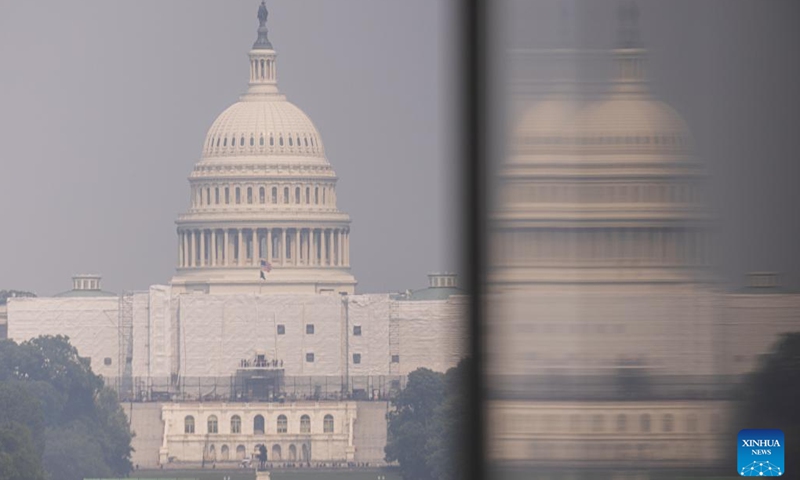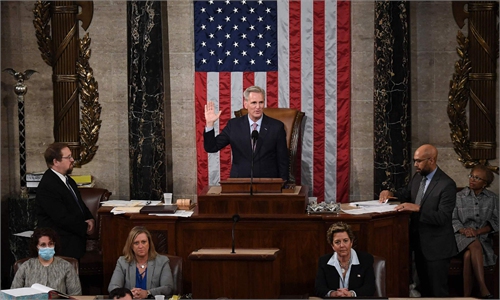
The U.S. Capitol building is shrouded in haze.(Photo: Xinhua)
Republicans who control the US House of Representatives nominated on Wednesday Steve Scalise to serve as speaker following last week's ouster of Kevin McCarthy and Scalise will face off against the Democratic candidate for Speaker of the House. Experts said on Thursday that as some Republican members of the House of Representatives are extremely averse to compromise and in the current situation of severe polarization between the two parties, the operation of the US Congress will still be hindered.
According to Reuters, Republicans now hold 221 seats in the House, just nine more than Democrats. House Republicans would need to unite behind Scalise to reach the simple majority threshold needed to be elected speaker. At the same time, House Democrats unanimously renominated Minority Leader Hakeem Jeffries in a closed-door meeting Tuesday night.
According to Xinhua News Agency on Wednesday, before the election for the Speaker of the House, the House of Representatives will remain in a "paralyzed" state and will be unable to advance any legislation. Both domestic and foreign affairs in the US urgently need to be resolved, including providing assistance to Israel in the face of a new round of Israeli-Palestinian crisis, and pushing for the approval of the federal government's appropriations bill for the current fiscal year.
However, in the current situation of severe polarization between the two parties and significant divisions within the Republican Party preventing it from reaching consensus on key issues, the election of a new speaker may be difficult, and the operation of the Congress will still be hindered, inevitably affecting the two parties' ability to reach a consensus on the budget bill, experts noted.
Media reports have described McCarthy's ouster as unprecedented in US history, with experts attributing his weak position as the most direct reason for his downfall. McCarthy secured the position of Speaker earlier this year after five days and 15 rounds of lengthy voting. His appointment to this position was the result of compromise among various forces.
To win internal party recognition, McCarthy granted opponents excessive power to impeach the speaker, a compromise that became a sword of Damocles hanging over his head, Sun Chenghao, a fellow and head of the US-EU program at the Center for International Security and Strategy in Tsinghua University, told the Global Times on Thursday. Once unable to balance the interests of the various factions within the party, his position would be sacrificed, Sun noted.
Observers said that some Republican members of the House of Representatives are extremely averse to compromise and are willing to engage in partisan struggles whatever the cost, even if it means shutting down the government.
In this impeachment vote, not counting abstentions, the Democratic Party unanimously voted against McCarthy. To overcome this difficult situation, the incoming Speaker will need the support of Democrats, Sun said.
However, the problem is that the two parties are currently engaged in an intense conflict, and internal divisions are difficult to bridge. McCarthy's impeachment will undoubtedly exacerbate the degree of political polarization and political strife, experts warned.
It is worth mentioning that Scalise's specific focus on the direction of "the risk of China" is not consistent with McCarthy's, so his election may affect the change of China-related legislation, Sun noted.
However, as the US' China policy is not entirely dominated by the Congress, and the White House plays a key role in shaping this policy, even if the speaker is replaced, it will not bring about major changes in the House of Representatives and even the Congress' China policy, he said.

